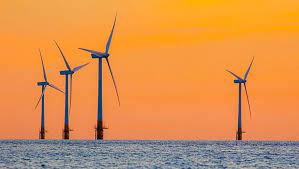Unions welcome ' long overdue' offshore renewable energy laws, but it's ‘unfinished business’
THE Electrical Trades Union (ETU) and Maritime Union of Australia (MUA) have welcomed what they are calling "long overdue laws to facilitate offshore renewable energy projects".
It is a critical first step by the Federal Government in allowing the development of offshore renewable energy, especially offshore wind, which the ETU and MUA have long been advocating for, according to MUA assistant national secretary Adrian Evans
He said the unions were now calling on the Federal Government to immediately begin consultation on the location of Offshore Electricity Areas to give certainty to projects that will create jobs, clean energy and economic investment in regions already slated for offshore wind. The areas included are the Gippsland region of Victoria; the Hunter and Illawarra regions of NSW and; the Rockingham/Bunbury/Geographe Bay region of West Australia.
Mr Evans said Federal Energy Minister Angus Taylor "must make the consultation on the Gippsland Offshore Electricity Area his highest priority".
“Star of the South, the Gippsland and Latrobe Valley communities, and maritime and electrical workers have already waited years for the government to get this legislation in place,” Mr Evans said. 
“The Australian Energy Market Operator (AEMO) is already planning for an Offshore Wind Zone in this area. The Federal Government needs to catch up and give project proponents the certainty they need.”
ETU assistant national secretary Michael Wright said the Minister "must complete this consultation and declare a suitable Offshore Electricity Area before any offshore wind developers can apply for a Feasibility Licence".
“Building offshore wind will play a critical role in creating thousands of jobs for workers affected by the energy transition, whether they work in coal-fired power stations, coal export ports or offshore oil and gas,” Mr Wright said.
“These projects can create a strong and consistent supply of renewable energy, next to the heavy industries that need it, and also create green hydrogen in bulk for use by these industries while delivering regional diversification and opportunities for workers.”
The MUA and ETU also cautioned there was still more work to do on the legislative framework for the industry with the need for further regulations to be developed for the licencing process for each project.
“The government needs to create regulations which must be used to maximise the use of local goods and services, the employment of local workers (particularly energy workers) to foster opportunities for training and skills development, and to increase employment and income opportunities for First Nations people,” Mr Evans said.
“However, this work must not delay the process of declaring Offshore Electricity Areas.
“The consultations needed to make appropriate declarations of these areas must occur now, to allow time for strategic environmental assessments, feasibility studies and planning.
“And while the important environmental, feasibility and planning is being completed there is unfinished business with the new offshore renewable laws.
“Despite union concerns the proposed framework requires offshore renewable operators to cross multiple Work Health and Safety jurisdictions each day and removes important rights for workers, the Government ploughed ahead," Mr Evans said.
“Substantial work is needed to ensure that the Work Health and Safety provisions are fit for purpose and properly harmonised with the national Work Health and Safety system.”
Priority areas
The four areas the ETU and MUA are proposing that consultations begin on declaring Offshore Electricity Areas are:
- As a priority, a Gippsland Offshore Electricity Area, which is already being planned by AEMO as an Offshore Wind Zone, and is the site of projects planned by Star of the South and Flotation Energy. Significant transmission capacity is available now.
- An Illawarra Offshore Electricity Area, which is already being planned by AEMO as an Offshore Wind Zone, and is the site of projects planned by Green Energy Partners and Oceanex. Significant transmission is available with a low expansion cost.
- A Hunter Offshore Electricity Area, which is already being planned by AEMO as an Offshore Wind Zone and is the site of projects planned by Oceanex and Newcastle Offshore Wind. 10 GW of transmission capacity is available now, making it the lowest expansion cost of any Renewable Energy Zone onshore or offshore.
- A Rockingham/Bunbury/Geographe Bay Offshore Electricity Area, which is the site of projects by Green Energy Partners and Oceanex.
ends

